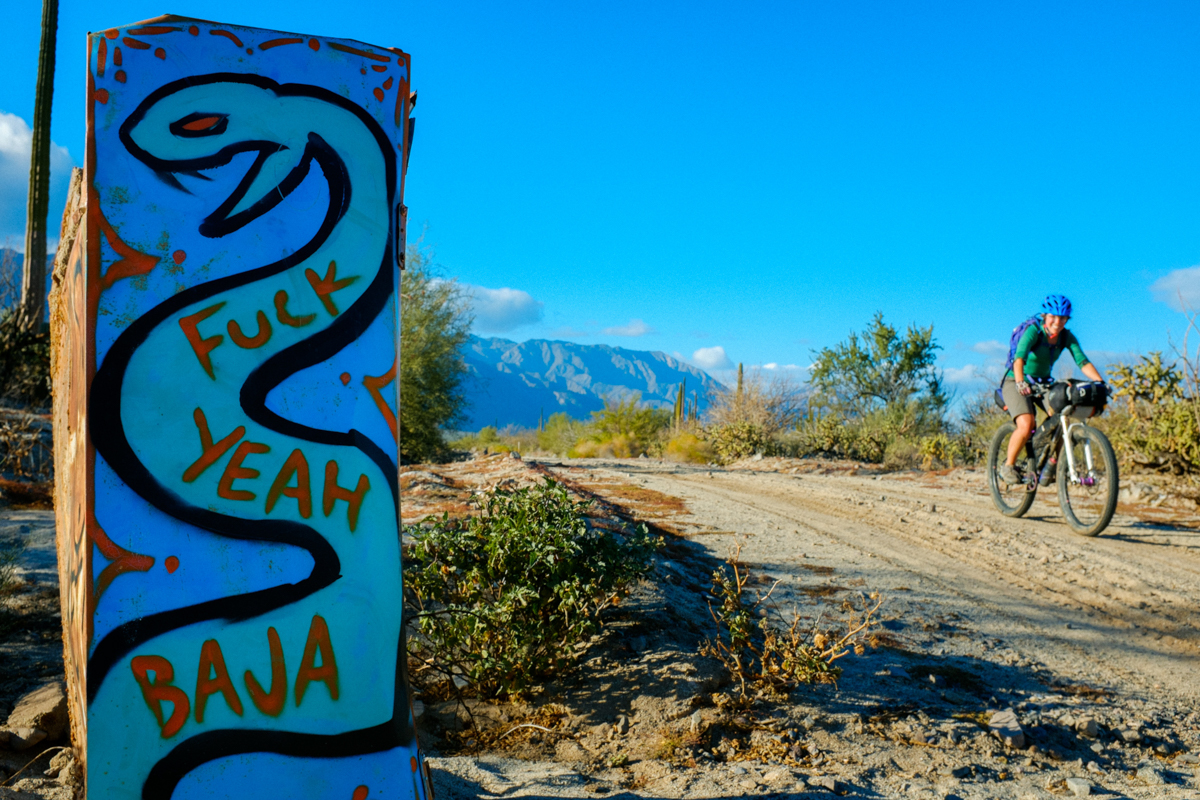Me Gusta: Touring Baja by bicycle
Originally posted on October 26, 2017 at 1:07 amBy Montana Miller
“We’re going to San Felipe. On a bike tour,” I say to the Mexican border guard, nodding toward my dusty bike. We’re going a lot farther than that, but I’m hoping our first stop sounds more believable.
“San Felipe? On bicycle? No.” He looks at me like I’d just told him I was planning to row a boat to Mars. “Where in San Felipe?”
The surrounding buildings are bright purple, doctors’ offices jammed on top of one another. White-haired American and Canadian snowbirds flap around in nervous flocks, looking for cheap drugs. Guys in front of the dentists’ offices yell, “Hey, amigo, need a tooth cleaned? Come! Best price!”
“Uh …” I freeze up, can’t remember the name of the hotel. Lobster something. Spanish red lobster. No cheesy buns. I look at my tiny wife, Colleen. Help me.
“The Langosta Roja,” she says. The border guy nods, turns and motions for us to follow him.
“Habla Español?” one of the other border guards asked, arms crossed.
“Un poco.” They shake their heads, laugh at me. “But I’m trying to learn!” They laugh again.
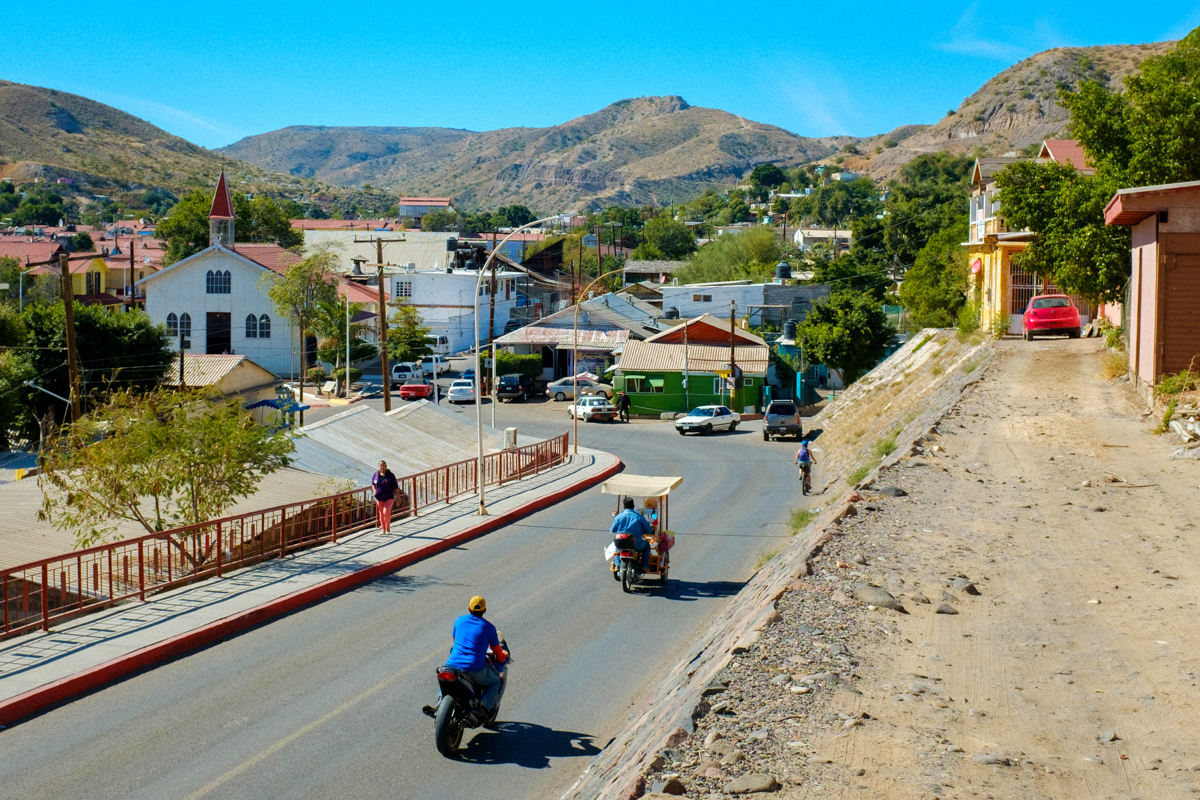
In the immigration office, the border guy drops his tough-guy tone. Now he’s concerned.
“Where will you sleep? You can’t make it to San Felipe today,” he says.
“We’ll be camping,” I say.
“Camp? Outside?” He takes off his glasses and rubs his forehead. “Mexico is dangerous, amigo.”
“I bet we’ll be OK,” I say, although to be honest, I’m jittery. It’s hard not to be; almost every person I’ve told about this trip has had that same sad, knowing expression, like they’re imagining the headline: “Newlywed American Couple on Honeymoon Bike Tour Dismembered by Narcos; Remains Found in Goat Turds.” And I couldn’t help but search the Internet for real traveler horror stories — like the Australian surfers who were burned alive in their van, or the motorcyclist from New York who was chopped up with a machete and packed into a garbage bag.
But there are plenty of terrible things that have happened in perfectly safe places like Connecticut and Colorado Springs. Even staying home can be dangerous; houses are flammable. So hell.
“Enjoy your time in Mexico, amigos,” the guard says and slides our visas across the table.

In Ciudad Morelos, 12 miles later, I’m almost too overwhelmed to keep my bike on the road. The air is smoky with grilled beef, woodstove and burning plastic. Buildings are bright yellow, red and lime green with cracked plaster walls. Dirt side streets have no shoulder. Every store, taco stand and gas station has a giant speaker turned to max volume thumping reggaeton beat on top of beat. Llantera, llantera, llantera—tire shop after tire shop. Impact wrenches clatter, hammers clang.
A cloud of dust covers us when a pickup truck bangs off the road to pass us, then weaves the other way around a stray Chihuahua. The guys in the back of the truck have bandanas over their faces; one stands up to wave his arms and yell something. Thumbs up, welcome to Mexico.

We’ve been on the peninsula a couple weeks now. After we made it through the farmland of the Mexicali Valley, and the dead, barren salt flats that are the delta of the Colorado River, the place became awesome; jagged mountains, giant cactus and harsh desert drop straight into the greenish-blue Sea of Cortez.
It stormed last night, and the next morning, it’s still pouring—the first time it’s rained here in six months. We roll up to a compound called Coco’s Corner, totally soaked.


“Hey, bicycles. Two bicycles! Come in, come in, please,” a legless man yells. There are a couple other bike tourists already sitting on his porch. “Bring the bikes inside! Warm up, have coffee. Dry your things. Please.” When he says please, it’s an order.
We roll the bikes up and lean them on the shack. Bras and panties flap in the wind from the ceiling of the porch, beer-can wind chimes tink along the ocotillo fence and a ring of toilets face a dead TV on a dead engine block. A few cats run around and, from the smell of things, crawl under the house to pee.
Coco is almost 80, is missing both legs below the knee and shuffles around on his stumps wearing leather kneepads. He lives alone, off the grid 20 miles from his closest neighbor (via a gnarly dirt road), in a place that’s too dry to even sink a well for water.
After he decided that he liked this spot in the desert 26 years ago, he claimed his little ranch, set up topes (speed bumps) in the middle of the dirt highway and started funneling people into his ranch. He has a row of campers and lets people stay the night for free—although you’d be nice to buy some beer from him.
Since we’re soaked, it’s still raining and I like beer, it’s a pretty easy decision. We hang up our stuff and hang out.
The other riders are a German couple on the seventh month of a tour from Whistler to Argentina. Then three more riders roll in.
“Seven bicycles, one day!” Coco yells. “Never, this don’t happen before.” He’s excited and heaves out his giant duct-tape-covered guest book for everyone to sign. “Gringas,” he yells at Colleen and the German girl. “Come, have some cake. Please.”
He instructs me to light his garbage on fire. It’s not cake, but it’s been years since I’ve gotten to torch a big pile of plastic. The poisonous flames sputter in the desert drizzle.
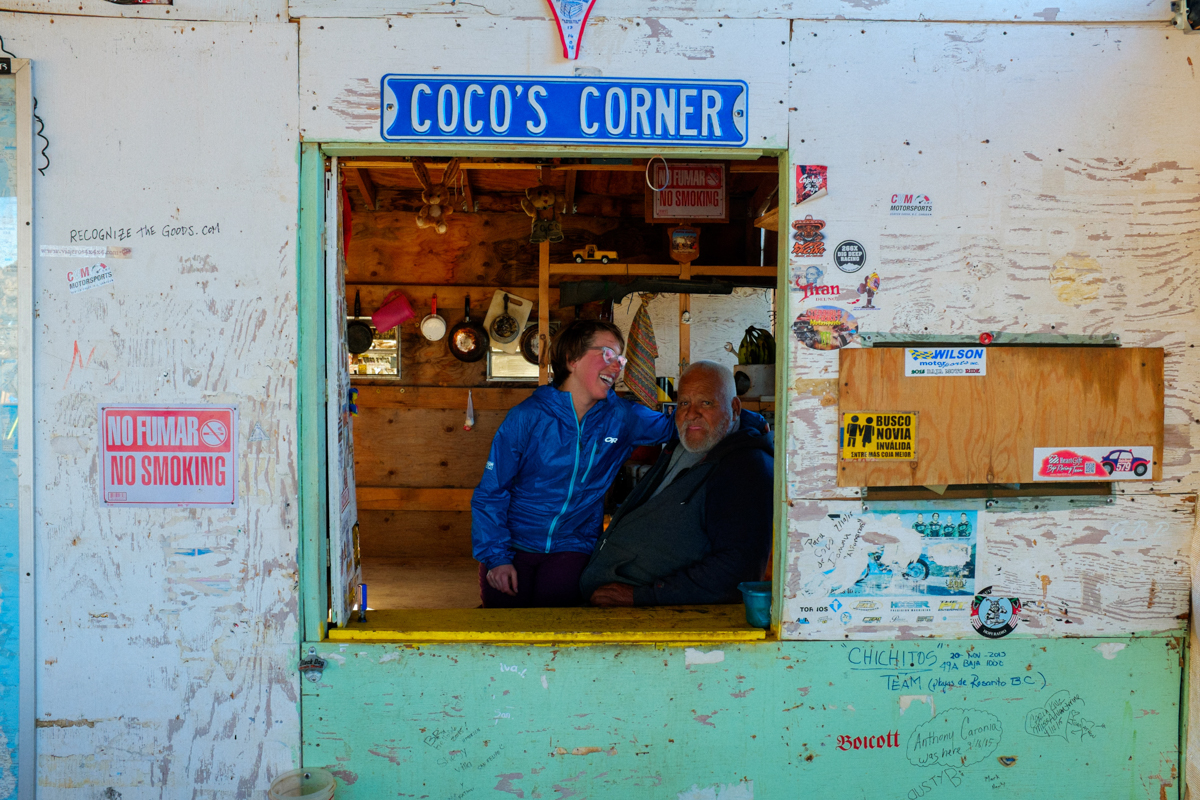
Before we leave the next morning, I ask Coco if he’s glad that the road will be paved in a couple years.
“No, I don’t want a highway,” he says firmly. That’s the way almost everyone out here that I’ve talked to has felt. But nobody gets elected by promising stagnation, so on the world goes, paving over places like Coco’s.

A few miles later, I start wishing the pavement was already here. Because we aren’t going anywhere. It’s pouring, I led us onto a bad section of road and the bikes jammed to a stop instantly.
After I spend a few minutes screaming and waving a middle finger at the sky, accusing it of incest, licking a bitch dog’s happy place and engaging in intercourse through the wrong hole (wrong para mi—para ti, maybe it’s good), I feel refreshed. Colleen waits for me to finish my rant, rain dripping down her glasses.
“OK, let’s get off the road, clean the bikes and ride through the sand,” I say. We shuffle through the mud, dig the bikes out with some rocks, then set off through the salt brush. We make it to pavement an hour later, the sun comes out, there’s a loncheria that serves chorizo and eggs and everything is great again.

After grinding our way across the sandy mountains for a few weeks, we’re at an RV park that’s mostly full of retired Canadians. It’s real cheap, the view is good and the shower is nice.
I’m on the beach, trying to clean the sand out of my headset so that it stops crackling. (Which is going about as well as surgery in an airport bathroom. Or that time I tried to drain a staph infection with a razor blade I’d sanitized with a couple of matches. Or that time my friend Scott tried to drain a staph infection with a steak knife that he didn’t sanitize with anything. But you probably get the idea. I was contaminating the headset.)
Mostly I’m just happy to be fiddling with my bike for a while on a rest day. One of the older Canadian guys walks up to us with a bunch of fish.
“You want fresh fish?” he kind of yells.
“Oh, thanks,” Colleen says, looking up from her book a little surprised. “But we don’t have a way to cook it. Thanks, though.”
He looks offended. “Well, I’m going to go clean it. If you want to get the fish, come over to our camper,” he sort of yells again. He shuffles off, shaking his head.
A while later, the old guy shuffles by again. “You know if somebody offers you fresh fish, you should take it,” he yells.
“I wish we had a way to cook it, but we just have a little alcohol burner,” Colleen says. Partly we’re just being lazy. The store is a half-mile away; we’d have to go buy limes and salt and stuff.
“Well, let me tell something. Somebody offers you something, you should take it. They offer to let you come to a party, go to the party.”
“Sorry, we just didn’t have a way to cook the fish,” Colleen says.
“Well, I would have cooked it for you,” he yells. Wish you would have given us that option before, I think. “There are lots of different people down here, and you get to see how they live. But people on bikes, they’re always here in the afternoon, up first thing in the morning, then they leave.”
And there’s his real problem: Everybody’s got their way, and their way is the right way. They think we’re nuts for leaving this perfect beach after a day; we think they’re nuts for staying here in a trailer for eight years. I decide not to backtalk the old man.
“Thanks for the fish, really.”


OK, I think I’ll be good now. I stand up slowly, covered in spiky grass seed. I’ve had four very loose stools (to use the clinical term) in the last 8 miles. The delicious eggs we ate at that not-so-clean house yesterday really seemed like a good idea. So did the watery, fresh goat cheese out of the not-so-clean icebox.
Thirty miles from pavement, and more than twice that from the closest real town, it’s not the best spot for this to happen.
I push my bike onto the road. Right now, I just have to make it another couple miles to the rancho.
A few pedal strokes and the hot, dusty road starts to look a little spinny; water sloshes around in my guts on the washboard surface. Oh, man. I unclip a foot and try to get it planted in the dirt.
Too late.
I turn and vomit on my right shoe. I thump my helmet onto the handlebar. Again. I groan. Can’t stop. So violent. Sun bakes down on the back of my neck and the road spins faster. Colleen holds onto my bike, and I try to push off and get moving again. Maybe the rancho has cold drinks. Have to get there. I puke again; this time I manage to adjust my aim and miss my shoe. How could there possibly be that much left in my stomach? Rolling on the horrible sloshy bumpy road.
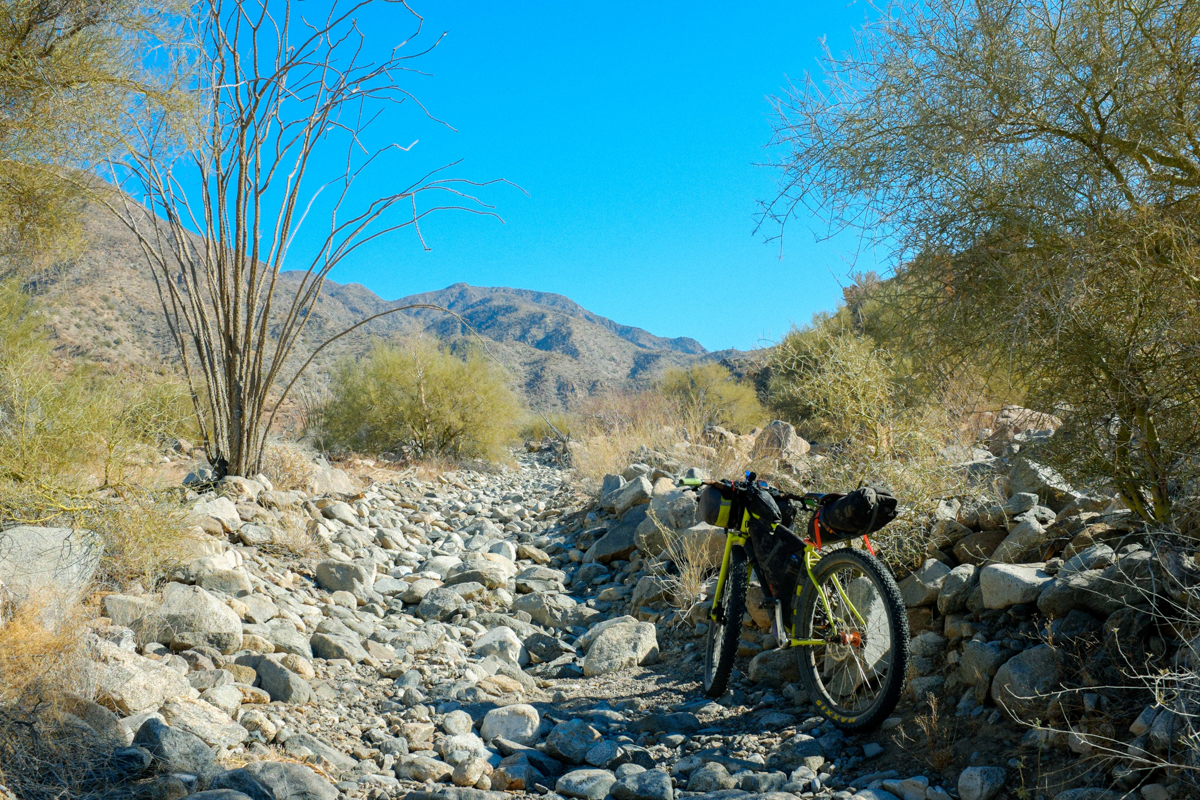
“Gotta lay down. Can you see if they have any Cokes?” I ask Colleen. I hand her my wallet, ride straight through the rancho to a palapa on the beach and drop in the shade. This is unfortunate. Little waves crashing on the rock beach and a dehydrated thumping in my head mix in a painful brain static.
A white pit bull from the rancho comes over to sniff me. I push him away. He licks my face. I push him away. He flops down across my stomach. Damn it, dog.
Colleen’s tires crunch the gravely dirt.
“Got a new friend?”
“Dog loves vomit smell.”
She leans her bike on the palapa and hands me a little bottle of water.
“This all they had?”
“Yeah, the lady from the rancho pulled it out from under her bed. She said they haven’t been to town in a couple weeks.”
“Great.” I chug the bottle—such tasty, good, wet water. My stomach burbles like an office water cooler.
Colleen sits down. Her stomach gurgles too.
“Oh, boy,” she says, stands up and runs for the bushes. I close my eyes, listen to the moist smacking sound of gastric juice hitting the dirt.

We lay in a dim little hut on the beach for the next 20 hours. Colleen cries into her smelly sleeping bag. This certainly is a low point.
The next morning, I can stand up again. I grab our water bags and shuffle across the beach to the rancho’s new water-purifying station.
“Perdón,” I yell to a guy bent over his car’s open hood. “Can I fill esos aguas aquí?”
He looks up. “Amigo, I can’t understand your Spanish.”
“Oh, sorry. Can I fill these here?”
“Yes. Of course.”

An old gringo that lives at the rancho walks past the hut wearing a big floppy hat with earthworm-pink, permanently sunburned skin and rheumy, sunken, red alcoholic eyes.
“Well, feeling any better today?” he says. His head vibrates when he talks.
“A little,” I say. “But she got it too.” I point at Colleen, who’s sitting on the stoop and staring at the ground. “Must have been something we ate.”
“Nope, I don’t think it is,” he says. “Flu’s been going around. I had it; Juan had it. You’ll feel OK today, then tomorrow your stomach will be going in four different directions. Should last a week!”
“Oh, great.”
“Yep. Well, I sure would hate to have that on a bike! It’s bad enough just sitting around!” His head vibrates for a few seconds after his last word for emphasis.
“Yeah.”
“I had some anti-diarrhea medicine, but I gave the last of it to Juan!”
“Oh.”
“Yep. Well, hey, good luck!” He turns his vibrating head.
“Hey, any idea if there’s anybody around that might be willing to give us a ride to the highway? We’d be happy to pay for it,” I ask, maybe hoping for too much. But yesterday he mentioned to Colleen that he had a truck.
His head vibro-swivels around. “Nope. I don’t think anybody’s going that way today!”
“Oh.”

We walk. It’s noon, sweat runs into my eyes, the dirt road is steep. Colleen sticks a thumb out when a truck struggles up the hill towing a boat. The driver waves.
We’re both still pretty weak from all the vomiting and no one at the rancho was willing to sell us food. Another truck rattles toward us; Colleen tries again. He stops — hell, yeah — I run back down the hill and throw both our bikes in the bed, moving a half-full gas can so we have room to sit.
“Listo!” I yell to the driver and he takes off, back end of the truck swinging around the switchbacks. I’m on the side with the drop-off; the bed hangs over the void, more than 1,000 feet down to the rocks below. Tires slide on loose dirt — my God, I hope he keeps it on the road — and Colleen has her eyes shut tight, but he must drive this all the time and he hasn’t crashed yet, I tell myself. Glad I left my helmet on, though.

A few weeks later, we’re in La Paz, the city at the end of Baja. Both of our bikes are broken: front hubs toast, my saddle rails snapped and tires on their last threads.
I’m on the roof of the decaying hotel with a case of beer, a crew of Mexican welders and a Canadian Romanian computer programmer who’s been wearing a T-shirt that says “NERD LIFE” for the last three days and has been trying to argue for just as long that clothes don’t say anything about who we are.
Ninety-seven degrees and welding-torch-bright sun is enough to quiet down the city; people nap in the shade and even turn down the speakers.
But that’s the calm. As soon as the sun sets, every bar and car and mouth and house are at full volume. I swear Mexican women can circular breathe when they get worked up; it’s the fastest, most impressive speech. Music is in the walls. I touch them and feel the plaster buzzing; some of it falls off in little dusty puffs.
One of the welders chews off the top of a beer can and spits the aluminum onto the roof. What a macho, macho man. (Repelled by displays like this one, Colleen is downstairs reading.)
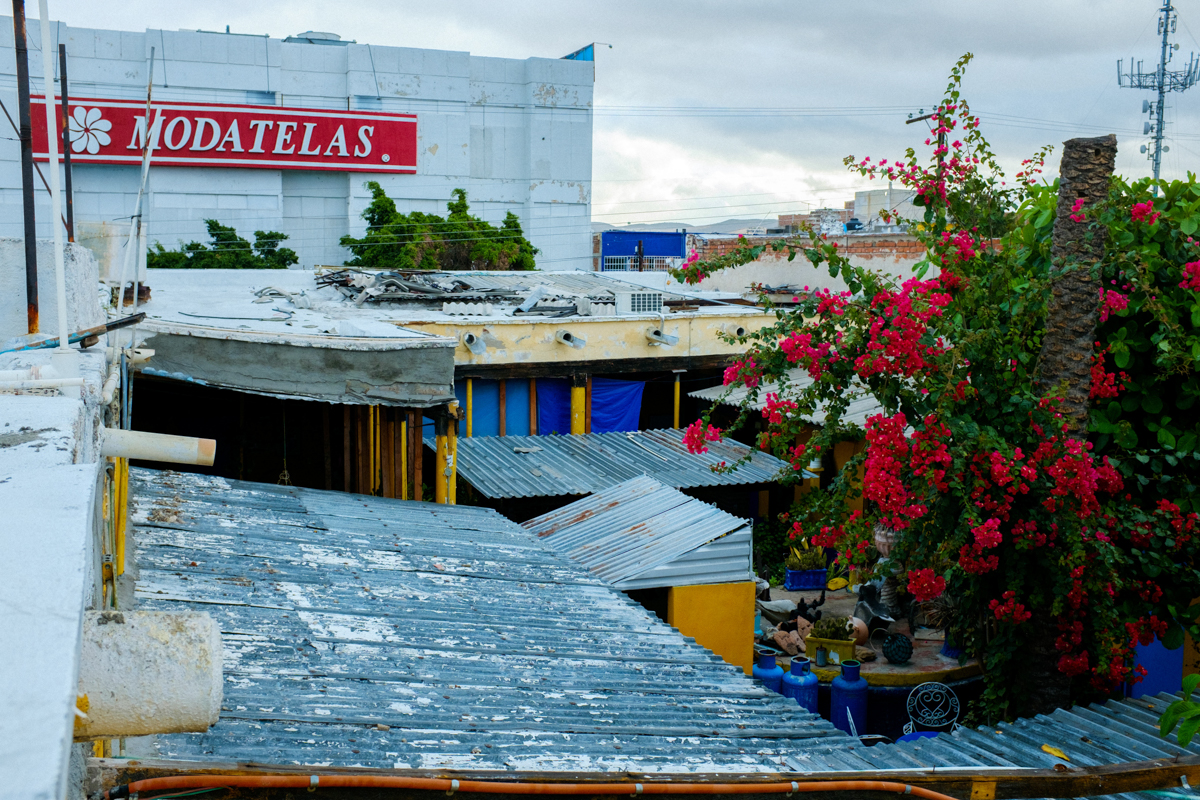
“Where you live?” I ask in broken Spanish. These guys are happy to have a conversation with hand gestures and bad conjugation, and the beer makes it easier.
“Los Mochis.”
“Mochis, where they caught El Chapo, the narc —”
One of the other guys hushes me. “Quiet, amigo,” he says, then pulls his hand across his throat. “We don’t say that name so loud.”
“Oh,” I say. He’s like Mexican Voldemort. It’s quiet on the roof. Reggaeton booms across the street in the Centro Nocturno.
“Tomorrow, our job is done and we go home,” says one of the guys.
Us too, I think. We’re about out of money, and with our bikes unrideable, we’re at the end of this one. Riding down Baja we’ve seen a tiny sliver of a huge country. In the desert, desolate, quiet, sandy, clean, but mostly a harsh place to be a big thirsty mammal. In the cities, all opposite and so close to the U.S., but so not the U.S. I can’t wait to come back; hopefully I’ll be able to convince Colleen that it’s worth the sunburn.
“What do you think of Mexico?” the welder asks.
“Me gusta,” I say, and take a sip of my yellow fizzy Tecate, although the beer could use some work. But I’m not sure how to say that last part in Spanish.


Six things you need to know:
Three tacos: $3/60 pesos
1.2 liters of Tecate: $1.50/26 pesos
Cheap hotel room: $20/350 pesos
Most common surface: Deep, soft sand
Tire width: 3.0 inches or more
Maps: Nothing good is in print, so use a GPS.




